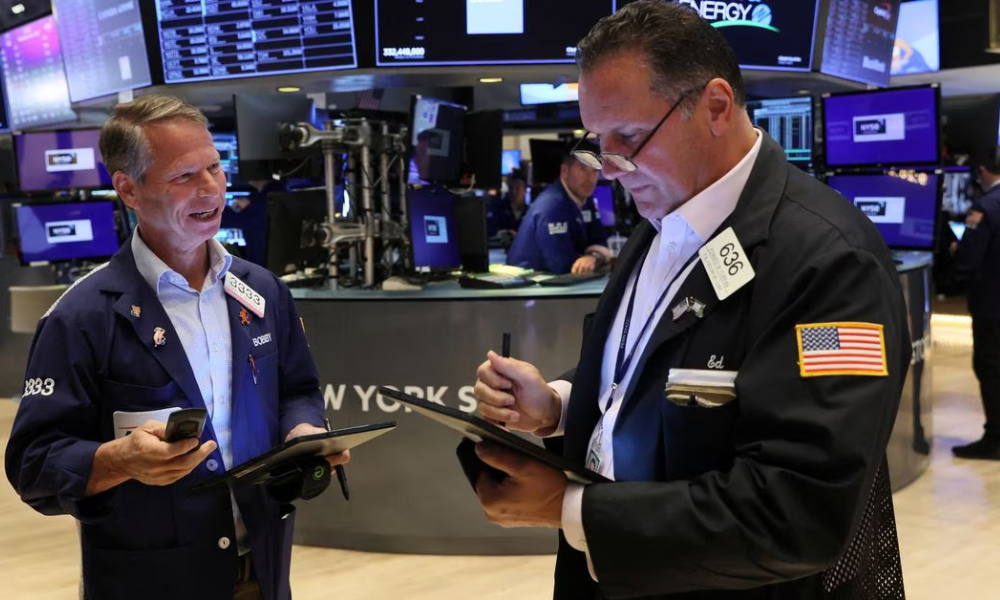
U.S. stock futures inch up Wednesday, as investors digest a Moody's downgrade of several midsized banks that hit shares on Wall Street in the previous session.
Elsewhere, Disney gears up to unveil its latest results as its ESPN division signs a partnership with gambler Penn Entertainment.
Meanwhile, inflation in China contracts in July, further exacerbating concerns over the country's post-COVID recovery.
1. Futures point higher
U.S. stock futures edged into the green on Wednesday, hinting at a rebound from declines in the prior session that were sparked by a downgrade of several regional banks by Moody's.
By 05:23 ET (09:23 GMT), the Dow futures contract added 91 points or 0.26%, S&P 500 futures rose by 17 points or 0.37%, and Nasdaq 100 futures gained 65 points or 0.42%.
The three major indices on Wall Street slipped on Tuesday, dragged down in particular by bank shares after Moody's slashed its rating of 10 midsized lenders.
The ratings agency highlighted concerns over sluggish deposits, elevated funding costs and risks to commercial real estate assets.
The move fanned renewed fears over the health of the U.S. banking sector, which is attempting to regain its footing following the failure of three regional lenders earlier this year.
Moody's also placed six banks on review, suggesting that further downgrades could also be coming.
2. Amazon in talks to become anchor investor in Arm prior to IPO - Reuters
Amazon (NASDAQ:AMZN) is in negotiations over joining a number of other technology firms as an anchor investor in Softbank-owned chip designer Arm's planned initial public offering, according to a Reuters report that cited people familiar with the situation.
The e-commerce giant would be one of about 10 tech sector players who are reportedly eyeing a cornerstone stake in Britain-based Arm, including semiconductor group Nvidia (NASDAQ:NVDA) and Google-owner Alphabet (NASDAQ:GOOGL).
Arm hopes to list on the Nasdaq in September, a source told Reuters, with the company aiming to raise between $8 billion to $10 billion.
For Amazon, the investment in Arm would also highlight its increasing focus on cloud computing.
Amazon Web Services, the company's all-important cloud unit, uses Arm's design to produce a processing chip called Graviton.
Both Amazon and Arm declined to comment, Reuters said.
3. Disney on deck
Walt Disney (NYSE:DIS) is set to headline the earnings calendar Wednesday, with the media conglomerate expected to face tough questions over recent box office busts and its sputtering television business.
This summer, "Haunted Mansion," Disney's latest push to create a movie franchise out of a famous ride at its theme parks, has delivered disappointing ticket sales.
"Elemental," a new release from Disney's animation powerhouse Pixar, also debuted in June to a poor opening weekend.
Disney's TV division, which once financed high-profile mergers, has struggled to entice lucrative advertisers. Its streaming unit, meanwhile, is not projected to make a profit until next year.
Chief Executive Officer Bob Iger, who returned to the role in November, has been musing publicly about potential strategic initiatives that could help reinvigorate returns.
Investors, who have seen Disney's stock fall by around a fifth over the past one-year period, will likely be keen to ask Iger for more details about these plans.
4. ESPN inks sportsbook partnership with Penn Entertainment
Iger's push to revitalize flagging segments of Disney was perhaps illustrated on Tuesday, when its ESPN sports network signed a $2 billion deal with casino owner and online gambler Penn Entertainment (NASDAQ:PENN).
Under the terms of the agreement, Penn will rebrand its U.S. sports betting portals, currently known as Barstool Sportsbook, as ESPN Bet.
Penn will pay ESPN $1.5B in cash over a 10-year term and grant $500 million in warrants for its stock. ESPN Bet will launch this fall in 16 legalized betting states.
The partnership will give ESPN an extra revenue source and access to the increasingly lucrative U.S. sports gambling sector, which has been growing in popularity since the Supreme Court struck down a federal ban in 2018.
It also marks a change of heart from Iger, who had previously veered away from tying together a family-friendly brand like Disney with the gambling industry.
He said in an interview with Time magazine in April that the "acceptance of sports betting has grown significantly."
5. Chinese consumer inflation shrinks
Chinese consumer inflation shrank last month, indicating that weak local liquidity and spending are weighing down the world's second-largest economy.
The consumer price index (CPI) fell 0.3% in the 12 months to July, although the number was slightly better than expectations for a drop of 0.4%, data from the National Bureau of Statistics showed on Wednesday.
This came after a flat reading for June and marks the first annual contraction in CPI since September 2021.
The inflation print comes after recent figures pointed to a deterioration in Chinese exports and imports as well as flagging growth in Chinese business activity.
It remains to be seen if Beijing will roll out further stimulus measures to boost what has been a waning post-pandemic recovery. Chinese officials have so far offered scant details on how they plan to shore up the economy.